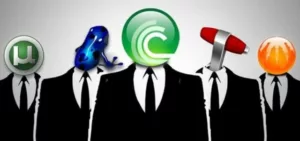Only two weeks after the largest torrent site KickassTorrents was taken down,
we were shocked again by the message displayed on torrentz.eu’s home page:
“Torrentz will always love you. Farewell.”
It’s been a rough day for its die-hard fans, one of whom claims that he’d
been using this site for 13 years. It also leaves us wondering if all
BitTorrent giants will be facing the same crisis.
With increasing pressure by publishers and copyright gangs of Hollywood, the
federal government were forced to implement more restrictive laws on online
piracy. And this nibbles away, bit by bit, our one and last frontier of
freedom – The Internet.
As the Internet is now being more potent than ever, traditional entertainment
companies start to believe that it brings more harm than good to them. Yet
they are not aware of the fact that, online sharing can actually have
positive effects on the entertainment industries. File-sharing on the
Internet help promoting movies and TV series to different countries with
accurate translated subtitles. There were even research reports supporting
this view. A few years ago, the LSE (The School of Economics and Political
Science) released a report with solid evidence proving that piracy has not
devastated the entertainment industry but instead, it might actually be
helping boost their revenues! Despite how hard industry lobbyists are trying
to exaggerate the impact file-sharing has had on them, there was more than
ample evidence showing that it actually benefits the creative industries in
various ways:
“Contrary to the industry claims, the music industry is not in terminal
decline but still holding ground and showing healthy profits. Revenues from
digital sales, subscription services, streaming and live performances
compensate for the decline in revenues from the sale of CDs or records.”
“Despite the Motion Picture Association of America’s claim that online
piracy is devastating the movie industry, Hollywood achieved record-breaking
global box office revenues of $35 billion US in 2012, a six per cent increase
over 2011.”
“Although revenues from print book sales have declined, this has been offset
by increases in sales of e-books, and the rate of growth is not declining
despite reports lamenting the ‘end of the book’.”
As the entertainment industries continue to state that online piracy is
hurting their business and try to dismiss these reports as inexhaustive
researches, they are also eroding our human rights on the Internet. And this
has obviously threatened Internet openness and innovation.
Everyone has the right to freedom of opinion and expression. With the rise of
the Internet, the opportunities to express oneself have grown drastically,
our lives have continued to be changed in unpredictable ways. File-sharing is
one of many of those life-changing ways. In a separate story, author Neil
Gaiman for example, noticed that when his books were “shared”, sales
would go up exponentially the following month. There are even actual
statistics proving that those who pirate content are more likely to spend
their money on new music, movie and gaming content. Looking back over the
years, many file-sharing sites have shut down, either voluntarily or forced
by the government. So what has changed after one by one of them was taken
down?
NOTHING.
Nothing happened except that new ones keep popping out, becoming the next
wave of pirating giants. There are resilient torrent giant like The Pirate
Bay – Founders got arrested, having been taken down and down, yet keep
bouncing back; then there are mirror sites and clones of the epic
KickassTorrents, kickasstorrents.website for example; there are also new
sites like iDope.se created by KAT’s fans to pay tribute right after the
next day their superstar was shut down…Maybe it’s time for traditional
entertainment moguls to learn to adapt to the growing number of digital
consumers before they lose their customer base to Internet technology.
(The views expressed in this article are the auther’ own views)








